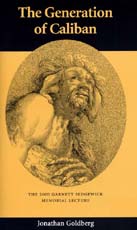Generation of Caliban, The

The Generation of Caliban
by Jonathan Goldberg
$8.95
- Spring 2002
- ISBN 978-0-921870-93-7 (0-921870-93-0)
- 5-3/4″ x 9″ Pamphlet, 36 pages
- Literary Criticism
- Out of print
In his University of British Columbia Sedgewick lecture for 2001, Professor Jonathan Goldberg explores the ways in which contemporary writers and critics have identified with Shakespeare’s figure of Caliban in his play The Tempest as a means of exploring the relationship of the colonized to the colonizer.
Examining the work of the great Barbadian novelist and critic George Lamming and others, Goldberg details the various ways in which contemporary writers have re-interpreted Caliban and the language imposed on him. In its simplest articulation, language is seen merely as a means of exploiting the colonial – Caliban being able to use language only for cursing – but in its more sophisticated usage, language can be used by the colonized as a means of understanding their condition and as an opening to futurity.
Nor is this “futurity” in terms of social relations only since, as Goldberg points out, Lamming imagines generation as outside the normal heterosexual roles. The readings of The Tempest offered by Lamming and others (including Sylvia Wynter and Michelle Cliff), Goldberg suggests, invite us to return to Shakespeare’s play and to see in it new possibilities. Included also in the pamphlet are a number of black and white illustrations of Caliban, dating from a 1736 Hogarth to present-day stage representations, and a portrait of George Lamming.
Garnett Sedgewick Memorial Lectures:
- From There: Some Thoughts on Poetry & Place by Stephen Burt (2015)
- More Heat than Light: Sex-difference Science & the Study of Language by Deborah Cameron (2012)
- Marvellous Repossessions: The Tempest, Globalization and the Waking Dream of Paradise by Jonathan Gil Harris (2011)
- John Donne and the Line of Wit: From Metaphysical to Modernist by P.G. Stanwood (2008)
- Living Language and Dead Reckoning: Navigating Oral and Written Traditions by J. Edward Chamberlin (2005)
- Spontaneous Overflows and Revivifying Rays: Romanticism and the Discourse of Improvisation by Angela Esterhammer (2004)
- “Servile Ministers”: Othello, King Lear and the Sacralization of Service by Michael Neill (2003)
- Grandchild of Empire: About Irony, Mainly in the Commonwealth by W.H. New (2002)
- Double Crossings: Madness, Sexuality and Imperialism by Anne McClintock (2000)
- Professing English at UBC: The Legacy of Roy Daniells and Garnett Sedgewick by Sandra Djwa (1999)



